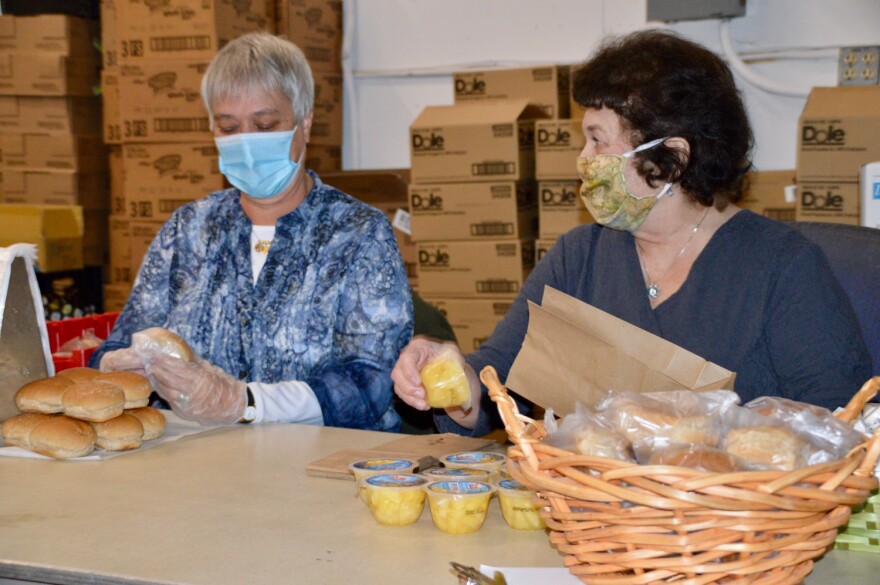When the pandemic hit, the number of seniors relying on Meals on Wheels surged nationwide.
Rutland and Bennington Counties have seen participation in their program increase 30% and officials say for many seniors, it’s the only regular contact with another person they have.
Meals on Wheels administrators in Rutland say when the pandemic first hit, scores of volunteers initially stepped up to help. Months in, many of those volunteers have gone back to work, which has made it difficult to keep up with demand.
5,000 meals-to-go, every day
It's noon and a dishwasher is scrubbing commercial sized pots and pans in the stainless steel kitchen owned by Lindley Food Service in Rutland. The company operates Rutland County’s Meals on Wheels Program.
While today’s lunch went out hours ago, Chef Thomas Frank is still busy pulling heavy trays out of the oven. “We’re making burgers for tomorrow’s meal,” he said.
Five-thousand of them.
Frank set the tray down and laughed. “Every day, yeah. It’s a job; it’s work; but it’s a good cause and it’s definitely something I believe in.”
Meals on Wheels delivers meals to people 60 and over, those at higher risk for COVID-19. The program also serves disabled people under age 60 through a different funding source.

In fiscal year 2019, Meals on Wheels in Vermont served approximately 18,500 individuals. Numbers for 2020 won’t come out until the end of this month, but officials expect them to be higher.
How much the meals program costs statewide is hard to tally, since it is run differently in different parts of the state. And funding comes from a complicated mix of federal, state and local money, along with grants, donations and contributions from the seniors who get the meals.
Pandemic brings about a surge in demand
Penny Jones manages Meals on Wheels in Rutland County, which prepares and delivers meals for a number of programs statewide.
“We are helping out the state with delivering to the homeless, to hotels in the different counties. We deliver in Rutland and Bennington and Franklin and Lamoille, and we’re still delivering for Age Well, which is up north. We go all the way to the Canadian border,” Jones said.
Age Well is a nonprofit that serves the elderly in northwestern Vermont.
More from VPR: As COVID-19 Surges, New Study Suggests Hunger Is At A Record High
Jones said because many older Vermonters don’t want to leave their homes for fear of catching COVID-19, demand for their services has skyrocketed. “Before the pandemic we’d made anywhere between 2,000 and 2,500 meals a day. When the pandemic hit, we were [and are] up to about 5,000 meals a day, and 7,000 on a really big holiday.”
Last spring, when businesses had to close, Jones said they were inundated with volunteers, which she called a godsend.
But most of those people have since gone back to work.

Many of their regular drivers are retired, Jones added. Some have had to stop driving, she said, because they're afraid of endangering their own health or putting family members at risk.
Hiring new drivers and other workers has been more difficult, she said, because many people prefer to collect unemployment or are leery of working outside their home.
More from VPR: 'There Is So Much Good Happening Here': One Vermonter Fights Hunger In Her Community
“We're desperate,” said Jones. “I mean, we're really desperate for people to bag and do stuff because our staff is working a lot of hours. You know, even if you can volunteer for an hour a week, we can use you.”
Jenny Young, a spokesperson for Meals on Wheels for America said a recent survey they conducted found 86% of local programs report they are struggling with staffing because of COVID-19.
And staffing isn’t the only challenge.
Meal programs grapple with funding
Courtney Anderson is nutrition director at the Southwestern Vermont Council on Aging, which oversees funding for Meals on Wheels in Rutland and Bennington counties. Anderson said federal COVID-19 relief funds helped cover the initial surge in demand. But she said no one knows if what’s been allocated to pay for Meals on Wheels through the current fiscal year - which ends next September - will be adequate.
“Typically in the winter months, sometimes our numbers could go down because we had a lot of what we would call 'snowbirds' kind of leaving and going down to Florida for the winter months,” Anderson explained. “That's not really happening, and so we're seeing a larger uptick in the clients signing up for meals.”
More from VPR: 'Navigating A Holiday Solo This Year?' Here Are Some Helpful Tips
This isn’t like a typical year, she went on, so there aren’t historic trends to rely on for budgeting. “We have no projections to compare it to,” she said, which worries her.
Kathleen Paquet, Nutrition and Wellness Director at Central Vermont Council on Aging in Barre, said many of the nonprofit community partners they work with to deliver Meals on Wheels will have to dip into rainy day funds to cover costs this fiscal year.
She said she's already looking down the road at fiscal year 2022, and she admits she's worried.
Have questions, comments or tips? Send us a message or get in touch with reporter Nina Keck @NinaPKeck.
We've closed our comments. Read about ways to get in touch here.





